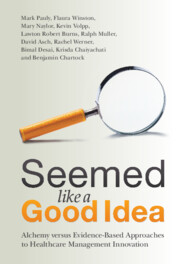 Seemed Like a Good Idea
Seemed Like a Good Idea Book contents
- Seemed Like a Good Idea
- Seemed Like a Good Idea
- Copyright page
- Contents
- Figures
- Contributors
- Preface
- 1 Baseline Observations
- 2 Evidence and Growth in Aggregate Spending and Changes in Health Outcomes
- 3 The Benchmark Decision Model, the Value of Evidence, and Alternative Decision Processes
- 4 Care Coordination
- 5 Evidence-Based Programs to Improve Transitional Care of Older Adults
- 6 Vertical Integration of Physicians and Hospitals
- 7 Evidence on Provider Payment and Medical Care Management
- 8 Evidence on Ways to Bring about Effective Consumer and Patient Engagement
- 9 The Unmet and Evolving Need for Evidence-Based Telehealth
- 10 Evidence and the Management of Health Care for Disadvantaged Populations
- 11 Driving Innovation in Health Care
- 12 Concluding Chapter
- Index
7 - Evidence on Provider Payment and Medical Care Management
Published online by Cambridge University Press: 14 July 2022
- Seemed Like a Good Idea
- Seemed Like a Good Idea
- Copyright page
- Contents
- Figures
- Contributors
- Preface
- 1 Baseline Observations
- 2 Evidence and Growth in Aggregate Spending and Changes in Health Outcomes
- 3 The Benchmark Decision Model, the Value of Evidence, and Alternative Decision Processes
- 4 Care Coordination
- 5 Evidence-Based Programs to Improve Transitional Care of Older Adults
- 6 Vertical Integration of Physicians and Hospitals
- 7 Evidence on Provider Payment and Medical Care Management
- 8 Evidence on Ways to Bring about Effective Consumer and Patient Engagement
- 9 The Unmet and Evolving Need for Evidence-Based Telehealth
- 10 Evidence and the Management of Health Care for Disadvantaged Populations
- 11 Driving Innovation in Health Care
- 12 Concluding Chapter
- Index
Summary
One striking feature of the US health system, for people like us who are interested in evidence on how improvements in the way medical care is provided and financed affect its outcomes and costs, is that we have a pluralistic, not to say fragmented, medical care payment system. What is wrong with fragmentation? Think of a restaurant dinner for a large party of people. Usually they would order salads, main dishes, and desserts from a menu, and might be expected to ask the waiter to calculate the part of the check that represents their dishes – they would pay fee for service – and one could describe the pattern as fragmented. However, what if the group wants to divide the check equally? What if wine is cheaper by the large bottle but diners ordering different entrees want different wines, raising the bar tab? What if it is a restaurant where at least some dishes are better shared than on individual plates? Then a more integrated approach to dining and payment may lower cost may be better – at least for many. Many experts judge an arrangement in which health care is divided individually into different courses and ordered and paid a la carte as a system that is fragmented and ultimately costly to administer and inefficient. That is the challenge for payment reform – to move away from itemized “fee for service” (FFS) pricing to combined payment for a set menu or meal plan, and to do so in a way that will do more good than harm.
- Type
- Chapter
- Information
- Seemed Like a Good IdeaAlchemy versus Evidence-Based Approaches to Healthcare Management Innovation, pp. 246 - 273Publisher: Cambridge University PressPrint publication year: 2022
